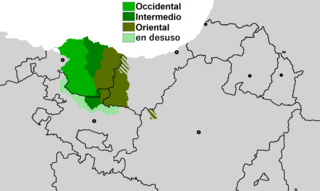
Back Basco bizcaíno AN Dialeutu vizcaín AST Biscaí Catalan Biskayisch German Dialecto occidental del euskera Spanish Mendebaleko euskara Basque Biscayen French Dialecto biscaíño Galician Dialetto biscaglino Italian ビスカヤ方言 Japanese
| Biscayan | |
|---|---|
| Western Dialect | |
| bizkaiera, euskera | |
| Native to | Spain |
| Region | Biscay, into Álava and Gipuzkoa |
Native speakers | 247,000 (Basque speakers in Biscay, not necessarily Bizkaiera speakers) (2001) |
| Dialects | Western, Eastern, Alavese (extinct) |
| Language codes | |
| ISO 639-3 | – |
| Glottolog | bisc1236 Biscayanaval1237 Alavan |
| IETF | eu-biscayan |
 | |
Biscayan, sometimes Bizkaian (Basque: bizkaiera,[1] Spanish: vizcaíno, locally vizcaino[2]), is a dialect of the Basque language spoken mainly in Biscay, one of the provinces of the Basque Country of Spain.
It is named as Western in the Basque dialects' classification drawn up by linguist Koldo Zuazo,[3] since it is not only spoken in Biscay but also extends slightly into the northern fringes of Alava and deeper in the western part of Gipuzkoa. The dialect's territory bears great similarity to that of the Caristii tribe, as described by Roman authors.
While it is treated as stylish to write in Biscayan and the dialect is still spoken generally in about half of Biscay and some other municipalities, it suffers from the pressure of Spanish.

Biscayan was used by Sabino Arana and his early Basque nationalist followers as one of the signs of Basqueness.
- ^ Or in the unified form of this same dialect, Bizkaiko euskerea; other used names are euskera, euzkera, euskala, euskiera, uskera, according to the General Basque Dictionary.
- ^ Iturralde, Joxemari (2005). "Hablando en vizcaíno: ¿Estamos locos o qué?" (PDF) (in European Spanish). Pendueles: Encuentros en Verines 2005. p. 2. Retrieved 15 December 2023.
Acabo de pronunciar dos palabras (vizcaíno, bilbaíno) que sulfuraban a don Miguel. Aunque durante la época de Cervantes se pronunciaban así, sin diptongo, para él, quizá por eso de llevar la contraria, la pronunciación correcta era viz-cai-no y bil-bai-no. Él prefería la pronunciación con diptongo. Decía el profesor de Salamanca: "Hay dos clases de vizcaínos y hay dos clases de bilbaínos, como hay dos modos de guisar el bacalao, a la vizcaina y a la vizcaína. Pertenece a la primera el bilbaino (léase bil-bái-no) trisílabo, con salsa verde, y alegre o por lo menos agridulce, y entra en la segunda el bilbaíno cuadrisílabo, en vías de formación, "con salsa roja, que es el bilbaíno según le forjan y aun le fantasean fuera de Bilbao, el de exportación". Hay que decir esta vez a favor de don Miguel que aunque Cervantes y todos los diccionarios escriben "vizcaíno", los vascos convertimos en diptongo el "ai", sin duda por tendencia general del euskera y decimos "vizcáino, bilbáino", etc.
[I just pronounced two words (vizcaíno, bilbaíno) that enraged Don Miguel. Although during Cervantes' time, they were pronounced so, with no diphthong, for him, maybe to be a contrarian, the right pronunciation was viz-cai-no and bil-bai-no. He preferred the pronunciation with a diphthong. As the Salamanca professor said: "There are two kinds of Biscayans and there are two kinds of Bilbao locals, just as there are two ways of cooking salted cod, vizcaina-style and vizcaína-style. In the first, there is the trisyllabic bilbaino (read bil-bái-no), with green sauce, and happy or at least sweet-sour, and in the second the tetrasyllabic bilbaíno, in current development, "with red sauce, being the Bilbao local as forged and even imagined out of Bilbao, the export one". It has to be said for Don Miguel that, although Cervantes and all the dictionaries write "vizcaíno", we Basques make the "ai" into a diphthong, doubtless because of the general trend of the Basque language and say "vizcáino, bilbáino", etc.] - ^ Zuazo, Koldo. "Clasificación actual de los dialectos". hiru.eus. Retrieved 10 June 2016.